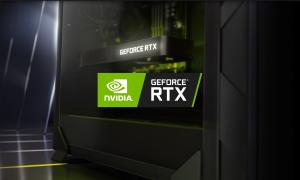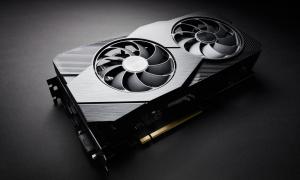Today’s CPUs are power-hungry and generate a lot of heat, so it’s natural that they demand good and efficient cooling to unleash their true potential. However, depending on your workload, be it gaming, video editing, or simply browsing the internet, the choice boils down to traditional air cooling and liquid cooling.
There are many factors at play when making a choice, including the cost, noise levels, performance, compatibility, reliability, and even maintenance. So, to help you make an informed decision, we’ve compared the strengths and weaknesses of all-in-one (AIO) liquid coolers and air coolers in today’s guide.
Liquid Cooling vs Air Cooling: How Does CPU Cooling Work?
Air coolers have a baseplate with heat pipes, which make direct physical contact with the processor. Thermal paste is applied between the CPU cooler and the CPU for efficient heat conduction. When the CPU gets hot, so do those heat pipes, and that heat is transferred to the heatsink.
The temperature is brought down using air through the cooling fans. Air coolers can have multiple fans with varying sizes such as 90mm, 120mm, or 140mm.
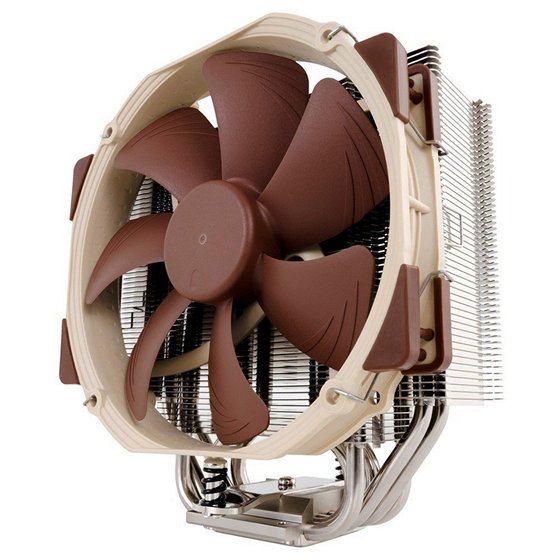
Both solutions require one of these best thermal paste options, so when installed, the baseplate of an AIO liquid cooler also comes into direct contact with the processor via the traditionally grey-colored goop.
Now, in the case of a processor cooled by a liquid cooler, the heat transfer and cooling process is done differently. In the liquid cooler, there is a pump, radiator, and liquid substance present inside the pipes. The liquid, also known as the coolant, constantly loops around the pipes and also gets actively cooled by the fans present on the radiator.
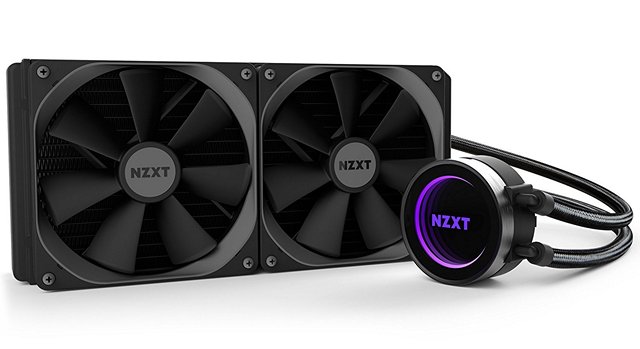
Liquid Cooling vs Air Cooling: What Makes More Noise?
Speaking of noise levels, an air cooler with a higher TDP capability (such as 250W) will be noisier than a liquid cooling solution, given it has similar cooling capability. If your preference is having a silent PC build rather than a noisy one, you should get a liquid cooler. Of course, the liquid cooler will also have fans that will spin and make some noise when running at high speeds.
Accordingly, a user can pick a liquid cooler with a big radiator size to facilitate quieter cooling by employing more fans. For example, a suitable high-end AIO liquid cooler with a 360mm radiator would potentially run at quieter noise levels compared to a liquid cooler with a 240mm radiator.
If you are wondering if liquid cooling is quieter overall, typically the answer is YES. Still, there are many acceptable low-noise air coolers in the premium segment, such as those from the likes of Noctua and Deepcool.
Liquid Cooling vs Air Cooling: Performance
Any AIO liquid cooler or air cooler will have a specific maximum cooling capability, which can be measured in watts (W). For example, the Lian-Li Galahad II Trinity ($178.99 on Amazon) that I’m using on Beebom’s Test Bench for CPU reviews such as the 14th-Gen Intel Core i9-14900K, the peak cooling performance I calculated for this AIO is ~338W whilst keeping the CPU temperature under 101 degrees Celcius.
This is a 360mm AIO liquid cooler and not a 420mm one, so the peak performance of AIOs can go even higher. Still, the Lian Li Galahad can handle some of the most powerful processors available for desktops today.
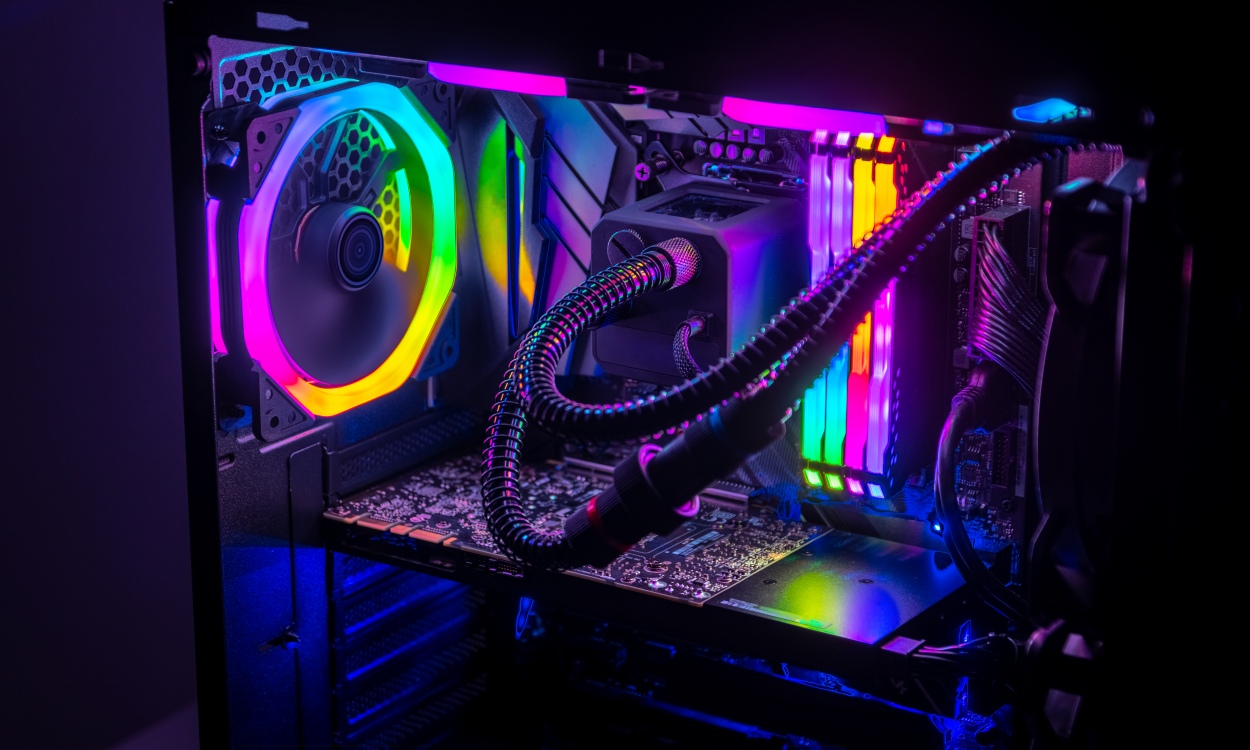
Typically, chipmakers Intel and AMD both recommend a 360mm AIO liquid cooler for higher-end desktop processors such as Core i9 and Ryzen 9 respectively because they are able to keep up with the power consumption.
Talking about air cooling, Deepcool Assassin IV is a good-looking high-performance CPU cooler that boasts a 280W TDP, and I’ve tested it out on my friend’s build. Given the Core i9-14900K has a 253W boost TDP and goes up to ~279W in a persistent load, as tested in our review. This high-end Intel 14th-Gen desktop processor works well even with an air cooler.
There are high-performance options available for both liquid cooling and air coolers, and they both can handle top-tier processors with high power consumption. When building a PC, the user could spend even more money on a custom liquid cooling solution with even higher cooling performance if that’s what they want.
Liquid cooling is overall better than air cooling, and theoretically more efficient (plus quieter noise levels). Despite this, it’s not like air cooling can’t match up to the demands of high-end processors.
Liquid Cooling vs Air Cooling: Compatibility
Compatibility is one of the major things you need to check before buying a CPU cooler for your PC build. You need to keep in mind a couple of things. First is the thermal performance that your CPU will require from the cooler. On the specifications page of your Intel or AMD desktop processor, you will find its power consumption under the TDP section. Now, you can pick compatible CPU cooler options, which are either air-based or liquid-based solutions.
From there, you need to check if the cooler offers enough clearance for other components that are installed on your motherboard, such as the RAM modules, VRM heatsinks, or even an M.2 SSD with a heatsink. To be honest, when I was picking a CPU cooler for my ASUS ROG B760i LGA 1700 Intel motherboard, things got quite complicated. The motherboard I bought seemed to be more oriented towards AIO liquid coolers, but I needed an air cooler instead for reasons I will discuss in the next section.
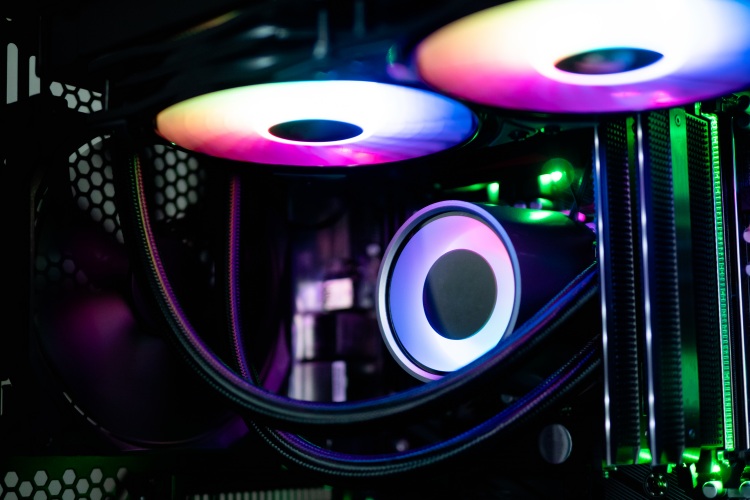
When it comes to compatibility in liquid coolers vs air coolers, AIO liquid coolers are more widely compatible. A huge air cooler may not fit in your PC case because the high-performance ones are really big. The size can ultimately end up being incompatible with many components, whether it be tall heatsinks or bigger RAM modules.
Even a 14th-Gen Intel Core i5 desktop CPU requires you to have a CPU cooler with 181W of cooling prowess for it to run at the advertised speeds. With that said, for most people, a 40mm or 360mm AIO is usually a better pick than air coolers based on what their PC can support.
Overall, liquid coolers generally offer better compatibility as long as you can fit the radiator in your PC case. The water block that is installed on your CPU is designed to not interfere with your RAM height or VRM heatsink, unlike many air coolers. Still, before picking any CPU cooler, you will need to cross-check everything as mentioned above, and perhaps look into other user’s builds to further confirm the compatibility of the CPU cooler with the rest of your build.
Liquid Cooling vs Air Cooling: Reliability & Maintenance
The reliability of an AIO liquid cooler can depend on the manufacturer, but let’s assume a modern generation liquid cooler by manufacturers such as Corsair, Arctic, Deepcool, or Lian Li. Speaking of long-term support, manufacturers offer anywhere from 3 to even 5-6 years of warranty based on the model.
During this period, provided there is no intentional damage done to the AIO liquid cooler, any of its components (such as the pump, radiator, lighting, etc.) should be covered under warranty if it stops working.
Modern AIOs also have reliable pumps, and cases of coolant spillage are super rare these days. As long as you don’t move the PC around too much with the AIO liquid cooler installed, there is no reason for your CPU cooler to stop working. Overall, there is a good level of reliability offered on AIOs. On many of the good models I would personally recommend, you can also get a long warranty of up to 5 years.

Despite this, you have to keep in mind that liquid coolers have more moving parts compared to air coolers, and hence, the reliability is overall less as compared to air coolers.
With air coolers, there is only one thing that can die, which is the fans. The heat pipes, as well as the heatsink, can last a very long time. In fact, some CPU cooler manufacturers release mounts for new motherboard sockets (such as Intel LGA 1700 and AMD AM5) so people can use their old somewhat ancient CPU coolers with their new builds.
I would also recommend air coolers over liquid coolers to those who move their PC around a lot. I have had a liquid cooler die out on me randomly after traveling with my PC, and after that, I have always stuck to air-based cooling solutions for my builds. They have been more reliable, at least in my experience.
Liquid Cooling vs Air Cooling: Which Costs More?
If you are looking for a high-performance CPU cooling solution, the Thermalright company recently released a new air cooler for under $50. Similarly, many affordably priced CPU coolers can give you great performance results for processors like the Core i7-14700K or Core i5-14600K.
For high-end processors, such as the Core i9-14900K that consumes 253W of power, the Deepcool Assassin IV ($99.99 on Amazon) can be the perfect option as it can effectively cool up to 280W. Air cooling is suitable and a more cost-effective option as compared to an AIO liquid cooler. However, there are a ton of value-for-money liquid cooler options on the market.
One such deal would be Arctic’s Liquid Freezer III (non-RGB variant), which usually sells for under $100. It can cool a CPU with up to 250-300W TDP, like the aforementioned Core i9, without much thermal throttling as long as there is no extra overclocking enabled. It is honestly such a good deal from a cost perspective.
AIO liquid coolers can get quite expensive based on the features you want. Some even include LCD displays and premium fans. However, from a performance perspective, there are several value-for-money options too like the one we mentioned above.
Essentially, air coolers for processors that require under 200W of cooling performance are usually more available from an affordability perspective. But for higher-end processors, a value-for-money AIO is a super appealing choice too. Not all liquid coolers are expensive, and in both categories, you can find affordable options.
What are your thoughts on liquid coolers vs air coolers for cooling your CPU? Do let us know in the comments below!














